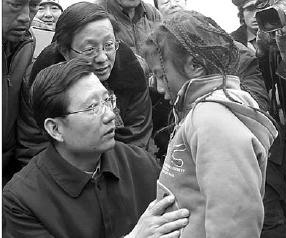Reconstruction of Gyegu gears up
Construction of permanent housing for quake victims in Gyegu will hit full stride next week.
"We will accelerate the construction of houses, schools, hospitals and other public facilities in the disaster area," Qiang Wei, Party secretary of Qinghai, told China Daily in an exclusive interview.
 |
|
Qiang Wei, Party secretary of Qinghai, comforts a little girl in the Yushu quake area on April 20. |
The worst-hit villages of Trangu and Ganda in Gyegu town are first on the list, he said.
Seventy experts have been on site since April 24 and will remain for another two weeks, conducting geological exploration, as well as infrastructure and construction research.
No effort will be spared to help quake victims move into permanent housing as soon as possible, Qiang said.
The magnitude 7.1 tremor that struck the Yushu Tibetan autonomous prefecture on April 14 killed 2,220 people, the Qinghai provincial government said.
More than 15,000 homes in Gyegu, or 85 percent of all homes, were made mostly of mud-wood structures and were flattened in the disaster, data shows.
Qiang said the new permanent homes would be made of concrete.
During the transition period to permanent housing, thicker, cotton-padded tents will be provided for victims staying in temporary shelters, Qiang said.
"In the countryside, where the temperature difference between day and night is large and cold winter weather lasts longer, the warmth of cotton-padded tents will be more practical than houses made of board," he said.
The location of new homes will take into consideration highways far from areas prone to geological disaster and sites convenient for quake reconstruction, as well as future infrastructure projects, Qiang said.
Temporary settlements will be equipped with schools, medical facilities, daily necessities, fire-prevention, sanitation and waste collection equipment to ensure quake victims are safe and comfortable.
Military and local hospitals are assisting the injured and carrying out disinfection work, Qiang said.
At the same time, more than 1,000 students have been transferred to the provincial capital and other provincial regions to continue their studies. Construction of temporary classrooms is also underway.
Five billion yuan ($732 million) of materials and funds have been donated to Qinghai from home and abroad. Ensuring relief supplies are distributed to victims in a rational and effective way will be paramount, said Geng Yang, director of the provincial department of civil affairs.
The quake-hit area has been divided into 19 distribution areas, with one division leader and one county-level leader organizing and supervising the distribution of the relief supplies, he said.
"A total of 1,500 armed police officers are also deployed in the 19 distribution areas to maintain order as well as help load and unload relief materials for the victims," he said.
Qiang said protecting the environment will be given priority in the reconstruction of Yushu.
Yushu is the fountainhead for China's three major rivers - the Yangtze River, the Yellow River and the Lancangjiang River. It has the reputation of being the "Chinese water tower" and is playing an extremely important role in environmental and ecological protection, Qiang said.
"Protecting the green hills, clear waters, plants and trees here has always been our important responsibility to the whole nation," he said.
By May 15, the expert team will determine the total population capacity of Yushu as well as point out suitable reconstruction sites.
Construction will be carried out through a detailed evaluation of soil and water resources, the ecosystem, natural disasters and economic development.
"Centralized drinking water sources, water quality, the surrounding environment and water supply stability with 16,000 to 20,000 cubic meters of supply a day, will be the standards for selecting drinking water sources," said Wang Yong, vice-head of the Yushu Tibetan autonomous prefecture.
 0
0 






